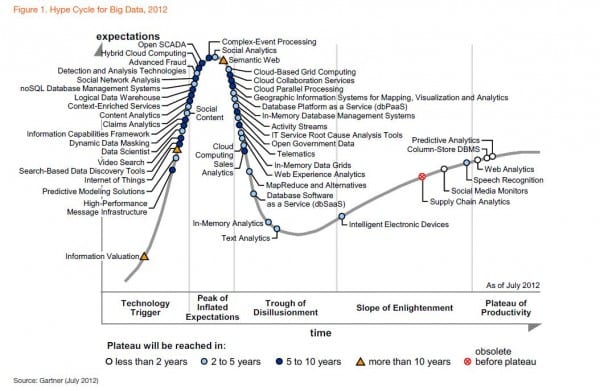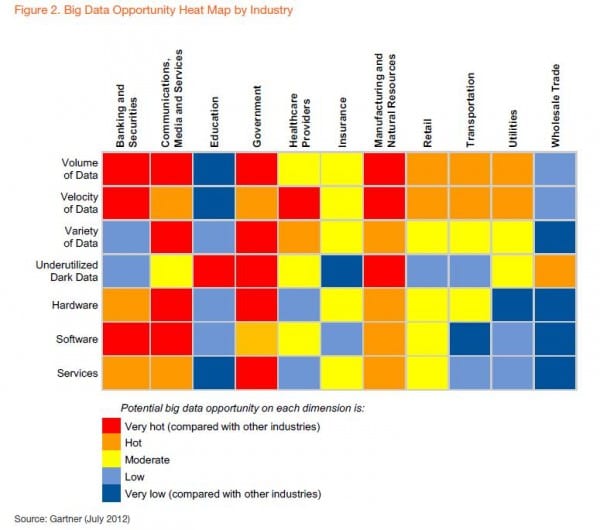The big data opportunity - 4 key parts towards creating a strategy
Today’s growth in interest in "big data" represents a phenomenal opportunity for creative and forward-thinking marketers. On the one hand big data is arguably nothing new, relative to any moment in time we've had too much data to be able to make effective use of, at least from my personal, marketing perspective. The data warehousing and statistical analysis that drove direct marketing forward through the nineties and early years of this millennium felt like pretty big data back then - lot's of disparate, 'unclean' sources, usually lacking in structure let alone a common location. Relatively speaking, nothing's really changed - really it hasn't. Today we have more channels, management software, disparate databases, automation, computer processing power, skilled people and yes - data - to deal with. As marketers, I believe that this in turn means we need better ideas and questions to make best use of it.
"Each day the world creates 2.5 quintillion bytes of new data. By comparison, all of the earth’s oceans contain 352 quintillion gallons of water; if bytes were buckets, it would only take about 20 weeks of information gathering to fill the seas" (IBM)
Big data and marketing
In marketing alone, one person's 'big data' is another person's 'unstructured data', or another's 'unvalidated data'. Saying big data is not a useful definition when you appreciate the massive moving beast that big data is beyond marketing. Gartner's latest Hype Cycle for Big Data reveals the handful of transformational trends that we're now experiencing including Cloud Computing, Complex Event Processing, Content Analytics and Telematics. It's a space transforming businesses.

From a marketing perspective, I see big data as unstructured, disconnected, multi-location and unvalidated data in the large part from which meaning and relationships can be identified through big data analytics tools. The best and obvious example is social data such as tweets or blog comments where the data is in less clean and less accessible. Businesses can ‘listen’ to the thousands of customers that call or comment each day, collecting and processing consumer opinion across products and services, as well as needs, wants and expectations. Imagine being able to do that across multiple communication channels including email, live chat and social media and you can begin to imagine the benefits a unified voice of the customer could have on marketing, sales, customer service and product development.
Small data is the term used for structured, clean and accessible data. You will know it better as CRM data, sales data or web analytics depending on the nature of it. 'Bigness' refers to the number of variables, the condition or cleanliness and the location or accessibility of the data - unstructured, unclean and multi location data is therefore 'big'.
“Where there’s traffic online, there’s opportunity for Big Data.”
Yuchun Lee, IBM’s vice president of enterprise marketing management
Big data is not just for big budget marketing
Data analytics is just another tool to increase revenue and profit. Every business needs to remain competitive, you've no choice if you consider that your competitors are likely already doing (or at least considering doing) the same with their own glut of data. As new software increasingly allows for better collecting, sorting and organising - turning data into actionable insight - big data offers significant competitive advantage.
Ad-hoc sales conversations are being replaced by instantaneous connections online. Businesses have to embrace new ways of relating to customers, if your business fails to collect, analyse, and understand proprietary data, the you're flying blind. There's just too much opportunity to start simple and leverage benefits across customer insight, feedback and research. And, of course sales through relevant outbound communication. The are many pros of big data, yet since much of the data collected by marketing revolves around ever-changing behaviour patterns, the most important opportunity is likely the discovery of new, relevant patterns that may not be noticed when using a small data sources.
Our 4 approaches for getting started
Thinking through how to apply big data concepts in organisations without huge IT budgets for data warehouse projects, these are four areas you can consider to develop a strategy
- Purpose - apply a strategy, purpose, priority, questions and most of all imagination - it's always been that way with getting value from marketing data. We've now got more untapped choices and more decisions. Purpose combined with the right questions of your data and you're half way there, we know this from web analytics alone. Is it the value of a Tweet, a Facebook post, an email response or website data capture to your company? What about usability, sales leads, product efficacy, or a combination of several?
- Aggregate - having access to the data your organization gathers means you can unearth powerful information about your users, potential customers, and own capabilities. You'll discover better ways to analyse for your needs, the most important thing is correct analysis, or maybe you'll see that you need to be capturing more data from particular sources to round out your set. Knowledge is power.
- Something - you need to get your feet wet. Invest a little time and money learning about software services that work online and don’t require buying servers or hiring engineers; though expect the latter to get cheaper as time passes. You can already see a burgeoning number of options growing through the open-source Hadoop platform, through to serviced parters like GoodData, Bime and InfoCaptor. The basic go-to sources include Google Analytics, social monitoring platforms, email or tools like KissMetrics. Compare the efficacy of different campaigns, target audiences or channels.
- Proof - Think return-on-investment spreadsheets and effort to demonstrate the potential, this can help prove the types of insights that can be gleaned from data and how those insights can be leveraged for decision making. Maybe you uncover a new audience segment, a cross-pollination between two channels, or a communications strategy that worked particularly well in one location but not another, etc. Model what kind of ROI that insight could have. Hopefully the realisation is one of, "Imagine if we had a tool that could help make hundreds of these ROI insights possible every month". Here is some guidance from Gartner on where the benefits could lie in different types of industry.

The key to big data success is imagination (in marketing at least)
Big data is not entirely new, but it is a whole new opportunity representing a significant step change in the recognition of data in ALL of its growing forms and the untapped benefits for an organisation. We might even say that it's the next, true competitive advantage, to be more customer orientated and better prepared to do business. To read more about big data strategies, see these three perspectives on competing through data.









